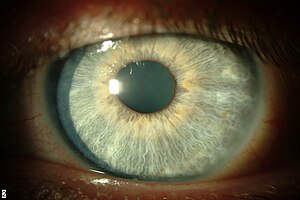Thygeson's superficial punctate keratopathy
| Thygeson's superficial punctate keratopathy | |
|---|---|
 |
|
| Full resolution of opacities. From Hasanreisoglu and Avisar, 2008. | |
| Classification and external resources | |
| Specialty | ophthalmology |
| ICD-10 | H16.1 |
| ICD-9-CM | 370.21 |
| DiseasesDB | 31288 |
| eMedicine | article/1197335 |
Thygeson's superficial punctate keratopathy (TSPK; also Thygeson Superficial Punctate Keratitis) is a disease of the eyes. The causes of TSPK are not currently known, but details of the disease were first published in the Journal of the American Medical Association in 1950 by the renowned American Ophthalmologist, Phillips Thygeson (1903–2002) - after whom it is named.
A patient with TSPK may complain of blurred vision, dry eyes, a sensation of having a foreign body stuck in the eye, photophobia (sensitivity to bright light), burning sensations and watery eyes. On inspection with a slit lamp, tiny lumps can be found on the cornea of the eye. These lumps can be more easily seen after applying fluorescein or rose Bengal dye eye-drops. The lumps appear to be randomly positioned on the cornea and they may appear and disappear over a period of time (with or without treatment).
TSPK may affect one or both eyes. When both eyes are affected, the tiny lumps found on the cornea may differ in number between eyes. The severity of the symptoms often vary during the course of the disease. The disease may appear to go into remission, only to later reappear after months or years.
The causes of TSPK are currently not yet well known. However, there seem to be indications that dysfunctioning of the meibomian glands can cause the condition. Inflammation of the meibomian glands (also known as meibomitis, meibomian gland dysfunction, or posterior blepharitis) causes the glands to be obstructed by thick waxy secretions. Besides leading to dry eyes, the obstructions can be degraded by bacterial lipases, resulting in the formation of free fatty acids, which irritate the eyes and sometimes cause punctate keratopathy.
There are a number of different treatments to deal with TSPK. Symptoms may disappear if untreated, but treatment may decrease both the healing time and the chances of remission.
...
Wikipedia
